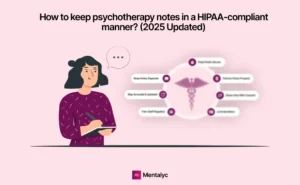If you’re a mental health professional, you might be familiar with writing progress notes after a psychotherapy session. There are many different types of documentation out there, and even though they may all sound similar, some are vastly different. Process notes are reflective journal-like notes that differ from progress notes, sometimes called process notes.
Psychotherapy notes have different requirements under HIPAA law. To protect yourself and your clients, learning what information goes into psychotherapy notes and what should be left out can be helpful. Psychotherapy notes are kept for your benefit and help you be a better therapist because you often write down your feelings, reflections, and observations. Many times, this information isn’t factual, but it does help you treat your client better. It would be best to keep process notes private and secure, as they have special legal protections.
Psychotherapy Notes and PHI
Psychotherapy notes are notes that mental health clinicians often keeps for themselves to help remind them of something, write down questions for supervision, or maybe record some general observations and feelings about the therapy session. Psychotherapy notes are for the benefit of the therapist or mental health professional and no one else.
There are multiple names for psychotherapy notes. Psychotherapy notes are sometimes also known as process notes. There is no requirement for clinicians to keep psychotherapy notes; therefore, there isn’t a right or wrong way to do them or a required format as there is with progress notes. It’s important to distinguish these notes from progress notes, which are part of the client’s official medical record.

New! Transfer your notes to EHR with a single click. No more copy-pasting.
In any medical documentation, Protected Health Information (PHI) is any information that can help identify a client created, used, or disclosed while providing a healthcare service.
According to the Department of Health and Human Services, there are various potential identifiers of PHI, which include:
- Name
- Geographic divisions that are smaller than a state
- Phone numbers
- Fax numbers
- Dates associated with a client (ex: date of birth, admission, discharge, etc.)
- Medical record numbers
- Health plan beneficiary numbers
- E-mail addresses
- Certificate/License numbers
- Photos (Including full-face photos)
- Biometric identifiers (such as fingerprints)
- Zip codes
- Vehicle identifiers
- URL’s
- Social security numbers
- Account numbers
- Device identifiers and serial numbers
- IP addresses
Psychotherapy notes are not part of the client’s official medical record and should have limited PHI because these often involve the inner thoughts of the therapist; it’s best to protect yourself and keep these notes secure if you write them. Psychotherapy notes have special protections under the Health Insurance Privacy and Portability Act (HIPAA).
HIPAA and Psychotherapy Notes
HIPAA has additional protections in place to limit the release of psychotherapy notes. According to the Department of Health and Human Services, there are special protections on Psychotherapy notes. Because these are special notes kept by the clinician, for the benefit of the clinician, HIPAA requires that you obtain client consent and authorization before releasing psychotherapy notes to anyone other than the clinician who wrote the notes.
The HIPAA Privacy Rule explicitly defines psychotherapy notes as this:
“Psychotherapy notes means notes recorded (in any medium) by a health care provider who is a mental health professional documenting or analyzing the contents of conversation during a private counseling session or a group, joint, or family counseling session and that are separated from the rest of the individual’s medical record. Psychotherapy notes excludes medication prescription and monitoring, counseling session start and stop times, the modalities and frequencies of treatment furnished, results of clinical tests, and any summary of the following items: Diagnosis, functional status, the treatment plan, symptoms, prognosis, and progress to date.”
Additionally, the HIPAA privacy rule states this:
“Psychotherapy notes are treated differently from other mental health information both because they contain particularly sensitive information and because they are the personal notes of the therapist that typically are not required or useful for treatment, payment, or health care operations purposes, other than by the mental health professional who created the notes. Therefore, with few exceptions, the Privacy Rule requires a covered entity to obtain a patient’s authorization prior to a disclosure of psychotherapy notes for any reason, including a disclosure for treatment purposes to a health care provider other than the originator of the notes. See 45 CFR 164.508(a)(2). A notable exception exists for disclosures required by other law, such as for mandatory reporting of abuse, and mandatory “duty to warn” situations regarding threats of serious and imminent harm made by the patient (State laws vary as to whether such a warning is mandatory or permissible).”
This means that to disclose psychotherapy notes to anyone; you must have authorization from the client. Ideally, these notes are kept private for the clinician’s benefit and should be released only in the situations required by law or abuse reporting.
What to keep in psychotherapy notes
Psychotherapy notes are notes that are kept for the benefit of the clinician. These may be observations about the client, questions to bring up in consultation or supervision, or hypotheses about the client. These do not include notes related to the client’s treatment. If you write psychotherapy notes, these are for your benefit.
You may notate something that you want to come back to later. You may need to obtain consultation or supervision on a particular topic. These private notes are meant to help you and are not part of the client’s medical record. You may also note an issue or information that came up during the session that you may want to get more training in. These notes are for your information and help you better treat your client.
When writing process notes, you focus less on the treatment and the therapy process. For example, maybe you are noticing some strong feelings in you that triggered you to want to notate this for your supervisor. In this situation, those strong feelings may be inappropriate to put in a client’s official medical record. In this case, writing a process note might be helpful. While there isn’t a right way to document a process note, these often take a form similar to writing in a journal. In process notes, you might write down your thoughts and feelings regarding the client.
Some suggest that you entirely anonymously write these notes and keep PHI out of them, as a judge can order the release of psychotherapy notes in specific situations. It’s up to you to judge your comfort level with what you write in psychotherapy notes.
If you still are unsure what is and isn’t okay to include in psychotherapy notes, consider obtaining consultation, speaking with your licensing board, or contacting your liability insurance provider.
What to keep out of psychotherapy notes
There is certain information you should keep out of psychotherapy notes. Since psychotherapy notes aren’t part of the client’s medical record, you should not put anything that constitutes medical or treatment information in the notes.
Here’s what should not be included in psychotherapy notes:
- Medication prescription and monitoring
- Start and stop times of psychotherapy sessions
- Treatment modalities used
- Results of any clinical tests or assessments
- Diagnosis
- Functional status
- Treatment plan
- Prognosis
- Symptom description
- Any overview of the client’s progress
- Treatment summaries
This information should be documented in mental health progress notes that are part of the client’s official medical record and should never be included in process notes. Psychotherapy notes should also exclude any information regarding payment of healthcare services, as process notes do not typically contain information regarding treatment, payment, or business operations.
The Bottom Line:
Psychotherapy notes are kept when the mental health professional decides these would be beneficial. Sometimes this is to address the therapist’s feelings or the therapy process. These notes often aren’t always factual but can help the clinician manage their feelings or not something they want to reflect on.
These notes are never shown to other people, including third-party insurance companies. There are no requirements to keep psychotherapy notes, and if you write psychotherapy notes, there is no standardized format you have to follow. Clinicians who write psychotherapy notes should be advised of the special protections for process notes and never release them to others without authorization from their client.
Choosing to write progress notes can help you grow and reflect on your psychotherapy sessions. There isn’t a wrong way to document process notes as long as you keep them separate from your client’s official medical record. The feelings that come up for you as a clinician can give you beneficial information about your work with the client, however; you should limit the amount of PHI you keep in psychotherapy notes. There are many situations in which you might write a psychotherapy note; however, you aren’t required to keep these types of notes per law and current ethical standards.
Sources:
- U.S. Department of Health and Human Services. (2022). Guidance Regarding Methods for De-Identification of Protected Health Information in Accordance with the Health Insurance Portability and Accountability Act (HIPAA) Privacy Rule. https://www.hhs.gov/hipaa/for-professionals/privacy/special-topics/de-identification/index.html#protected
- Office for Civil Rights (OCR). (2017). Does HIPAA Provide Extra Protections for Mental Health Information compared with Other Health Information? https://www.hhs.gov/hipaa/for-professionals/faq/2088/does-hipaa-provide-extra-protections-mental-health-information-compared-other-health.html
Why other mental health professionals love Mentalyc

“By the end of the day, usually by the end of the session, I have my documentation done. I have a thorough, comprehensive note … It’s just saving me hours every week.”
CDCII

“It takes me less than 5 minutes to complete notes … it’s a huge time saver, a huge stress reliever.”
Licensed Marriage and Family Therapist

“It’s so quick and easy to do notes now … I used to stay late two hours to finish my notes. Now it’s a breeze.”
Licensed Professional Counselor

“A lot of my clients love the functionality where I can send them a summary of what we addressed during the session, and they find it very helpful and enlightening.”
Therapist






